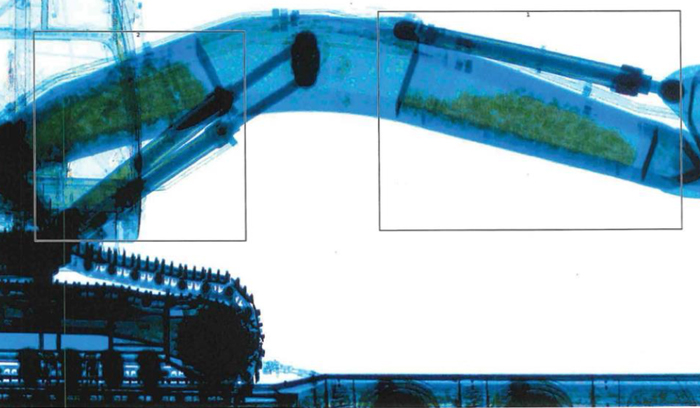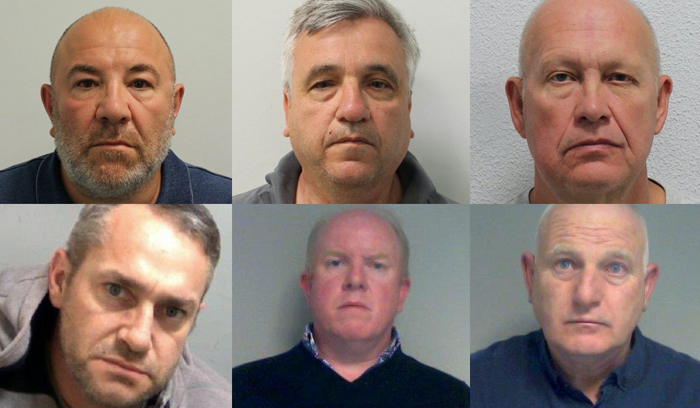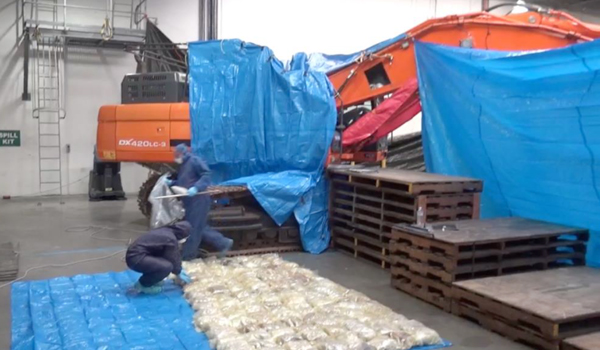Pet dog and ‘accidental selfies’ help convict international drugs traffickers
A man involved in smuggling a “colossal quantity of MDMA” with a street value of £44 million inadvertently helped investigators smash the crime network after he sent a photograph of his dog on an encrypted platform.
The picture, spotted on EncroChat by National Crime Agency (NCA) investigators, showed Danny Brown’s partner’s phone number on the pet dog’s tag.
Brown, 55, and another member of the organised crime group, 62-year-old Stefan Baldauf, incriminated themselves further by both sending “accidental selfies” on the encrypted communications service.
At Kingston-upon-Thames Crown Court on Tuesday (December 6), Brown, Baldauf and four other members of the drugs trafficking gang were jailed for a combined total of 140 years for their involvement in a conspiracy to smuggle almost half-a-tonne of MDMA – also known as ecstasy – into Australia in the arm of an excavator machine.
The Crown Prosecution Service (CPS) said it was “one of the biggest MDMA smuggling operations” it had ever dealt with.
The others jailed were Tony Borg, 45, Peter Murray, 59, Philip Lawson, 61, and Leon Reilly, 50.
Between June 2019 and June 2020, Brown and Baldauf, oversaw the operation to export the “massive quantity” of the Class A controlled drugs concealed in the lead-lined arm of an excavator. The drugs had an estimated street value of £44 million if sold in Australia – where MDMA’s street value is much higher than in the UK.
The NCA said the organised crime group (OCG) sent the 40-tonne Doosan digger to Australia under on the pretence of selling it.
They organised an online auction to make the excavator’s arrival in Australia look legitimate. But they rigged it by agreeing a pre-arranged bid with the intended recipients.
The gang had bought the excavator, a Doosan DX420, for 75,000 euro.
Borg accepted delivery of the excavator into a warehouse in Grays, Essex. Murray then delivered the drugs to the same warehouse, where Lawson later cut open the excavator arm and concealed 210 bags of MDMA inside. After sealing the excavator arm, the machine was moved to Southampton Docks, then shipped to Australia. It is believed the drugs were hidden inside the digger on December 19, 2020.
The NCA said it took from January 24 to March 13 to arrive in Brisbane, Australia.
However, unbeknown to the group, Australian Border Force officers X-rayed the digger, removed the drugs, sealed the arm and installed a tracker and listening device before letting it move onto its intended destination – an auction house in Sydney.

Reilly exchanged numerous encrypted Encrochat messages with Brown and Baldauf to update them on the machine’s progress and passage through Australia. Lawson then provided a detailed diagram showing where the MDMA was hidden and what tools would be needed to access the drugs.
Struggling to find the MDMA, the men in Australia responded with a picture of a hollow arm and told Brown the machine was empty.
Brown and his accomplices provided even more detailed explanations of where the drugs were concealed, but soon realised they had been stolen.
EncroChat messages show the six UK men launched their own investigation and held meetings to find out who had stolen the drugs.
On June 15, 2020, Brown and Baldauf were arrested together in Putney, southwest London. Brown was in possession of his Encro phone.
In Baldauf’s car was an iPhone with messages on it showing that he told people his Encro handle was ‘Boldmove’.
After being charged, the offenders repeatedly tried to get the case kicked out of court arguing the EncroChat evidence was inadmissible.
Specialist Prosecutor for the CPS, Colette Moore, said: “This case involved a colossal quantity of MDMA, with an estimated street value of £44 million, which posed a huge risk to the health and well-being of the Australian public. Organised criminals manufacture ecstasy and other synthetic drugs in dangerous illicit factories, so each individual tablet potentially poses a risk to life of those using it.
“Excellent work from the Australian authorities identified the drug concealment in the mechanical arm of an excavator arm and prevented its onward distribution. Collaborative international working with our Australian partners has resulted in the successful prosecution of the men who had exported these drugs to the Antipodes.”
The prosecution used the messages exchanged to demonstrate how many defendants were aware MDMA had been concealed in the excavator.
Demonstrating the use of the EncroChat phones was crucial to proving the case against Brown and Baldauf, said the CPS. The prosecution was able to link Brown to his EncroChat phone through a picture of his French Bulldog, ‘Bob’, which he sent to one of the other gang members. The dog had the same number on his collar that he had been sending messages on.
In another message, Brown, of Kings Hall Road, Bromley, Kent, sent a photo to his crime group of his television, which showed his reflection in it.
And Baldauf, of Midhurst Road, Ealing, London, sent a picture of a brass door sign with his face visible in the reflection.
In June 2020, Brown and Baldauf were arrested by NCA officers, and further investigation led to the remaining defendants’ arrests in the following months.

Ms Moore added: “The use of encrypted EncroChat phones failed to prevent the organised criminals being identified and prosecuted. In fact, the messages established, beyond doubt, that these men were responsible for the drug export to Australia. The more they used them, the deeper the incriminating hole they dug for themselves.”
EncroChat was taken down in 2020.
The NCA-led Operation Venetic – the UK law enforcement response to the takedown – provided investigators with messages offenders had sent believing the platform was safe from global law enforcement attention.
EncroChat users’ real names did not appear on phone messages – instead, they all used a ‘handle’ which investigators needed to attribute to real-world suspects, said the NCA.
Chris Hill, NCA operations manager, said: “These men thought they were safe on EncroChat but my officers did a superb and painstaking job of building the evidence against them through a mixture of traditional and modern detective skills.
“Brown and Baldauf’s accidental selfies and the photo of Bob the dog were the cherry on the cake in proving who was operating those handles.
“But the OCG went to enormous lengths, even rigging an auction, in a bid to transfer the drugs to Australian conspirators.
“The NCA works with partners at home and abroad to protect the public from the dangers of Class A drugs which wreak so much misery on communities in the UK.”


